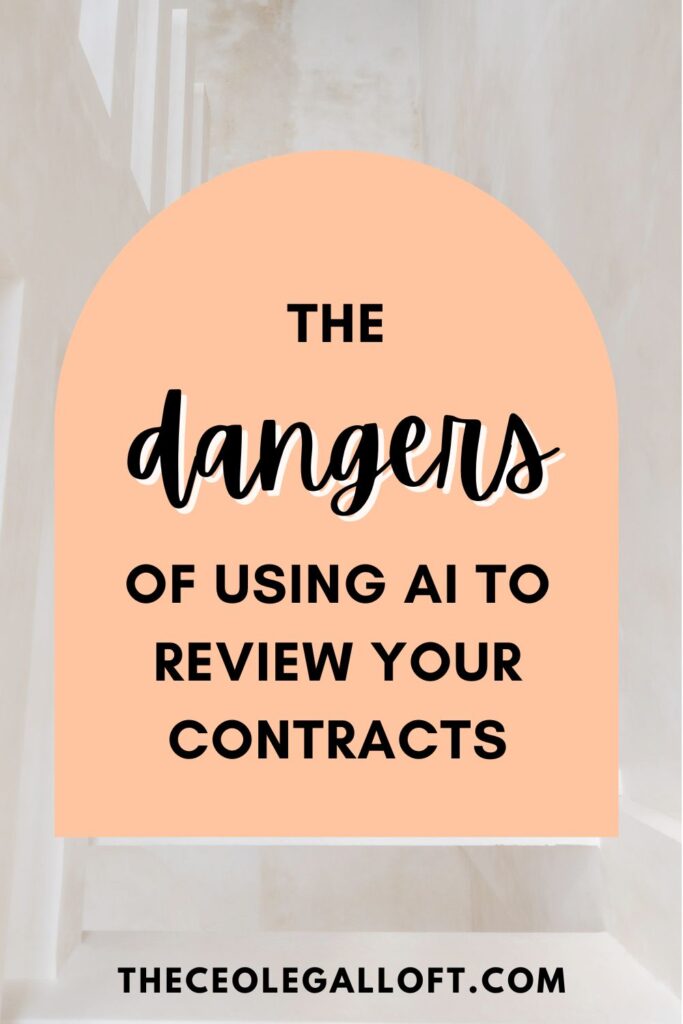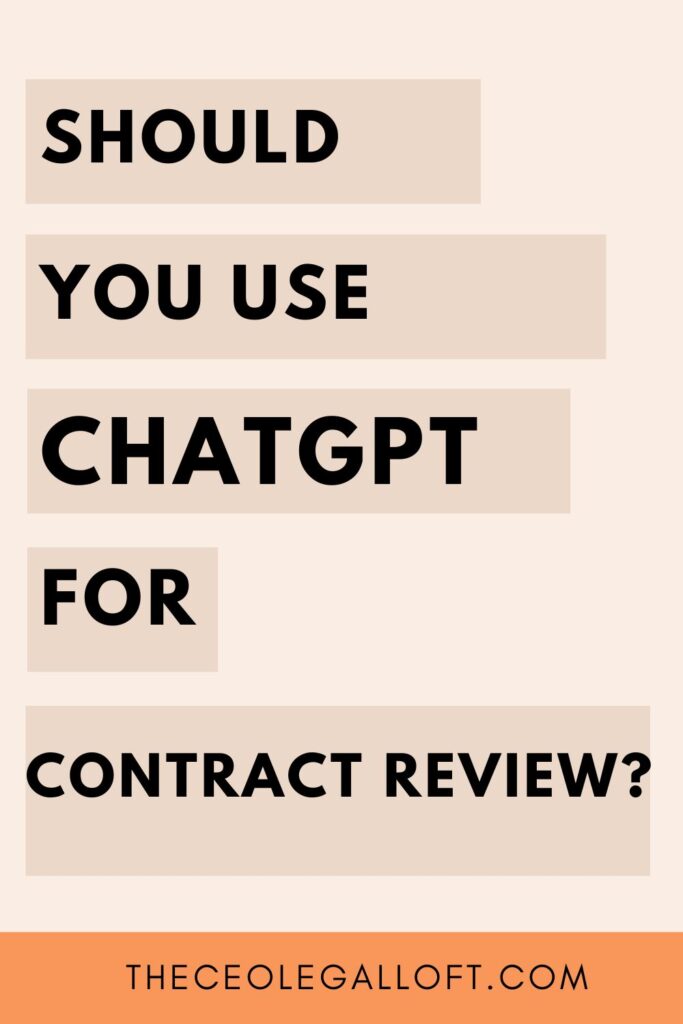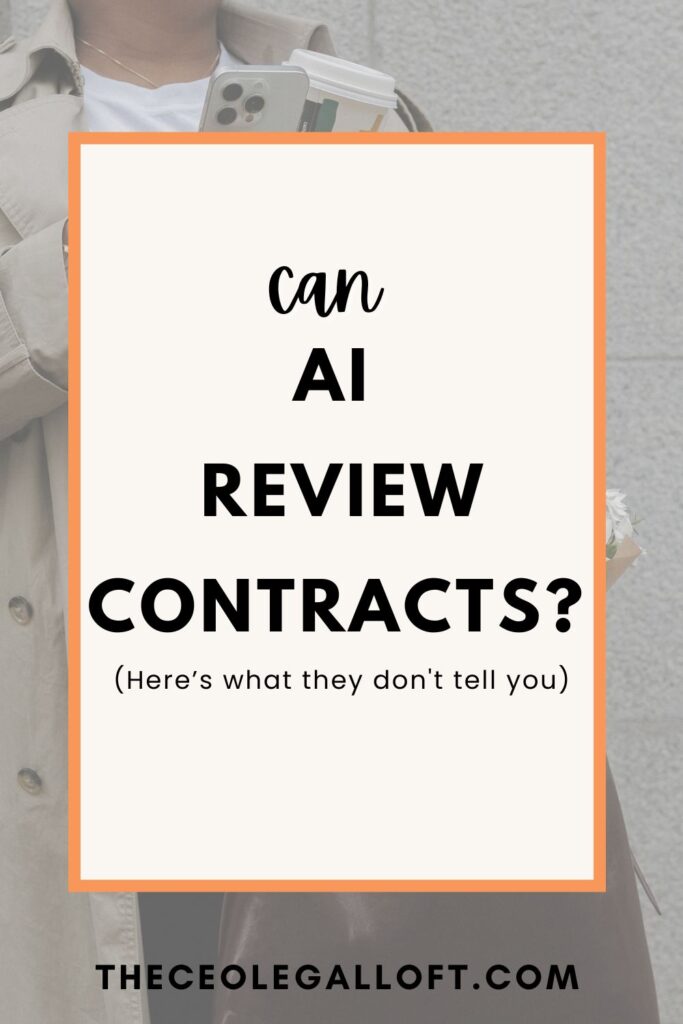It’s 11 PM on a Sunday night. You’re a freelancer reviewing a client’s contract terms that differ from your usual agreement, and they need you to start on this project ASAP. The 12-page document is full of legal jargon that might as well be written in ancient Greek. Your lawyer charges $400 an hour, and you’re not even sure this gig will pay enough to cover that consultation fee.
Then you remember ChatGPT. It’s smart enough to write code, explain physics, and be a “therapist” (no, but seriously go to an actual therapist if you can). Surely it can tell you if this contract is fair, right?
The short answer: No, ChatGPT shouldn’t review your contract.
The longer answer: It’s more complicated than that, and since thousands of people are already doing this anyway, let’s talk about how to minimize the damage.
This isn’t just academic curiosity. Real people are uploading contracts to ChatGPT every day, making decisions that could affect their businesses, their finances, and their legal rights for years to come. Some are getting lucky. Others are walking into legal landmines they never saw coming.
Whether you’re a small business owner, freelancer, or just someone trying to understand a contract without breaking the bank, this guide will show you what you need to know.
Why People Turn to ChatGPT for Contracts
The appeal of using ChatGPT for contracts is obvious and understandable. Legal fees have skyrocketed. The average lawyer now charges between $200-$500 per hour, and even a simple contract review can cost several hundred dollars. For small business owners and freelancers working on tight margins, that expense can feel impossible to justify.
Meanwhile, legal AI tools appear incredibly sophisticated. They can write complex code, explain scientific concepts, and even give you reassurance like a therapist. When you see them summarizing contracts, it’s natural to think: “Surely this can handle a basic contract review?”
The convenience factor is undeniable too. Lawyers keep business hours, but contracts don’t. When you need answers at midnight or over the weekend, ChatGPT is always available. There’s no appointment scheduling, no waiting for callbacks, and no awkward phone calls where you admit you don’t understand basic legal terms.
For many people, ChatGPT for contracts feels like the perfect solution. It’s a smart, available, and free alternative to in-house legal teams. It’s making legal more accessible to those who can’t afford it, right?
Not exactly. And the reasons in this blog reveal some fundamental misunderstandings about what contract review actually involves.

The Real Risks of Using ChatGPT for Legal Contracts
ChatGPT Makes Things Up (And Sounds Confident Doing It)
ChatGPT has a well documented problem called “AI hallucinations”. It generates information that sounds authoritative but is completely wrong. And even the owner of ChatGPT admitted that the tech does this. In casual conversations, this might be harmless. With legal contracts, it can be financially devastating.
For example, ChatGPT might confidently tell you that a “reasonable notice” clause means 30 days, when legally it could mean anything from 24 hours to 6 months depending on your industry, location, and circumstances. Or it might assure you that some boilerplate clauses is “legal standard” when it’s actually unusually broad and dangerous.
Here’s what could happen: A small business owner uses ChatGPT to review a vendor contract. The AI misses a personal guarantee clause buried in the fine print. When the vendor went bankrupt, the business owner discovered they were personally liable for $50,000 in unpaid invoices, and now their house is at risk.
Missing Context and Industry Nuance
Contracts aren’t just legal documents. They’re business documents that reflect industry standards, relationship dynamics, and strategic considerations. ChatGPT for legal contracts falls short because it doesn’t understand crucial legal context.
A non-compete clause that’s reasonable for an influencer might be career-ending for a hairstylist. A payment term that’s standard in construction could be predatory in consulting.
These nuances require understanding of industry practices, state laws, and business strategy, areas where ChatGPT simply can’t compete with human expertise.
Data Privacy Risks
When you upload your contract to ChatGPT, you’re compromising data security with OpenAI. This includes financial details, trade secrets, client information, and strategic business plans. Most contracts explicitly require confidentiality and using ChatGPT to review them likely violates that confidentiality before you even sign it.
It Doesn’t Know Your Jurisdiction-Specific Laws
Contract law varies dramatically by state and locality. What’s enforceable in California might be illegal in Texas. Employment terms that are standard in New York could violate labor laws in Colorado. ChatGPT doesn’t know where you live, what your local laws require, or how courts in your jurisdiction typically interpret disputed contract terms.
When Things Go Wrong, You’re Still Responsible
Most importantly, when ChatGPT gets it wrong, you bear all the consequences. The other party won’t care that specialized legal AI gave you bad advice.
Courts won’t excuse your obligations because you relied on it. You’ll still face the lawsuits, the financial losses, and the legal consequences of any missed terms or misunderstood obligations, even if it was summarizing contracts.

How to use chatgpt to review contracts (if you must)
Despite all these warnings, I know some of you will still use ChatGPT. If you’re determined to go this route, here’s how to minimize the damage with safer ChatGPT prompts for contract review.
1. Redact everything identifying
Before you upload anything, remove:
- All names (people, companies, addresses)
- Specific dollar amounts (replace with “X dollars” or ranges)
- Dates and deadlines
- Contact information
- Any proprietary or sensitive information
2. Use appropriate prompts
SAFE PROMPTS (Information Only)
- “Can you explain what this clause means in plain English?”
- “What does the term ‘indemnification’ typically mean in contracts?”
- “Help me understand the key sections in this agreement”
- “What questions should I ask about this type of contract?”
DANGEROUS PROMPTS
- “Is this contract fair?” This asks ChatGPT to make a subjective judgment that requires understanding your industry standards, market conditions, bargaining power, and business needs. “Fair” depends on context ChatGPT can’t access, like whether you’re desperate for work, if this client has special value, or if the terms reflect typical industry practices.
- “Should I sign this agreement?” This is asking for legal advice and a recommendation that could cost you thousands. ChatGPT might say “yes” while missing a personal guarantee clause that puts your house at risk, or say “no” to a perfectly reasonable contract, causing you to lose valuable business.
- “Are there any red flags in this contract?” This gives you false confidence that ChatGPT has comprehensively reviewed for problems. It might flag a standard indemnification clause as “concerning” while completely missing an auto-renewal trap or an unusually broad non-compete. You’ll think you got a thorough review when you didn’t.
- “Is this legal in [your state]?” ChatGPT doesn’t have current, jurisdiction-specific legal knowledge. It might tell you something is legal when your state recently banned it, or vice versa. Contract law varies significantly by location and changes regularly.
- “What are the risks of this contract?” Like the red flags question, this asks ChatGPT to do a comprehensive risk assessment. That’s something that requires legal training, industry knowledge, and understanding of your specific situation. It will likely miss significant risks while highlighting minor ones.
The core danger: All of these prompts make you feel like you’ve gotten professional contract analysis when you’ve actually just gotten educated guesses from a very sophisticated chatbot.
A legal prompt to use for ChatGPT
Instead of: “Review this contract and tell me if it’s good”
Try: “I’m looking at a service agreement. Can you explain what “liability caps” typically cover?Also, what does “reasonable notice“ usually mean in contract terms?”
And the more specific you can be about what answer you’re looking for, the better.
What This Approach Does:
- Keeps it educational, not advisory
- Doesn’t rely on ChatGPT to spot problems
- Helps you understand terms so YOU can evaluate them
- Reduces confidentiality risks
- Acknowledges ChatGPT’s limitations
What It Doesn’t Do:
- Replace legal advice
- Guarantee you’ll catch important issues
- Protect you from liability
- Account for local laws or industry standards
Remember, you’re essentially asking a very smart person who’s never been to law school to explain legal concepts. That’s fine for general education, but terrible for making important decisions about your business or financial future.

Better Alternatives to ChatGPT for Contract Review
If you’re looking for alternatives to ChatGPT for contract review that won’t break the bank, you have more options than you might think.
Free and Low-Cost Options for Contract Review
- Legal Aid Clinics: Most communities have legal aid societies that offer free or sliding-scale services for individuals and small businesses. Many focus specifically on business law and contract issues.
- Law School Clinics: Law schools often run clinics where supervised law students provide services at drastically reduced rates. The work is overseen by licensed attorneys, so you get real human review at a fraction of the cost.
- State Bar Association Resources: Most state bar associations offer referral services for affordable attorneys, often with reduced-rate initial consultations. Some also provide free legal education resources and template reviews.
Industry-Specific Solutions
- Professional Associations: If you’re in a specific industry, your professional association likely offers contract templates, guidance, and sometimes even review services for members.
- Government Resources: The Small Business Administration (SBA) and SCORE provide free business guidance, including contract advice. Many states also have small business development centers with legal resources.
- Lawyers who create legal templates: Many lawyers have template shops and contract templates that were created for specific industries and offers
When to Invest in Professional Help
While ChatGPT for contract review might seem appealing, certain situations always warrant professional legal help:
- Contracts involving real estate
- Employment agreements with non-compete clauses
- Partnership or shareholder agreements
- Any contract where you’re personally guaranteeing debt
- Agreements involving intellectual property
- Contracts worth more than you can afford to lose
Pro tip: Many attorneys offer fixed-fee contract reviews for standard agreements (my law firm charges $750+ for contract review). This can cost less than you’d expect and provides legal advice with nuance, not just explanations.
Red Flags That Mean “Get a Lawyer”
Some contract situations are simply too high-stakes for DIY approaches, including ChatGPT. If your contract contains any of these elements, skip the AI and go straight to a qualified attorney for human review:
- Personal Guarantees: If you’re personally guaranteeing business debt or obligations, your personal assets (including your house) could be at risk. This isn’t the time to save money on legal fees.
- Non-Compete or Non-Disclosure Clauses: These can severely limit your future career options. What seems reasonable today might destroy your livelihood tomorrow, especially as industries and job markets evolve.
- High Dollar Amounts: If the contract value exceeds what you can afford to lose entirely, professional review is essential. This includes rent agreements for expensive properties, major equipment purchases, or service contracts worth thousands of dollars.
- Complex Payment Terms: Contracts with unusual payment structures, penalty clauses, or complicated milestone requirements need expert review. These often hide expensive traps for the unwary.
- Intellectual Property Issues: Anything involving patents, trademarks, copyrights, or proprietary information requires specialized legal knowledge that general AI simply cannot provide.
- Unusual or Industry-Specific Terms: If the contract contains language you’ve never seen before, or terms that seem specific to a particular industry, that’s a sign you need expert guidance.
When in doubt, remember that the cost of getting it wrong almost always exceeds the cost of getting it right.
Using ChatGPT to review contracts should be a last resort
Using ChatGPT for contracts might seem like an automated contract review, but it’s more like getting legal advice from someone who’s never been to law school and occasionally makes things up. The technology is impressive, but it’s not a replacement for legal expertise.
Contracts exist to protect everyone involved, but they only work when you truly understand what you’re agreeing to. The stakes are simply too high to rely on AI that can’t understand context, doesn’t know your local laws, and has no accountability when things go wrong.
If you absolutely must use ChatGPT as a starting point, limit it to educational questions only. Never ask it for advice, always redact sensitive information, and understand that you’re still flying blind on the most important aspects of your agreement.
For anything that matters, and most contracts do matter, invest in proper legal review. Your future self will thank you for not cutting corners on something that could affect your business, your finances, and your legal rights for years to come.
Some things are worth paying for professional expertise. Your contracts are definitely one of them.

Great read and reminder. Thanks Michelle!
You’re welcome! I’m glad it was helpful.